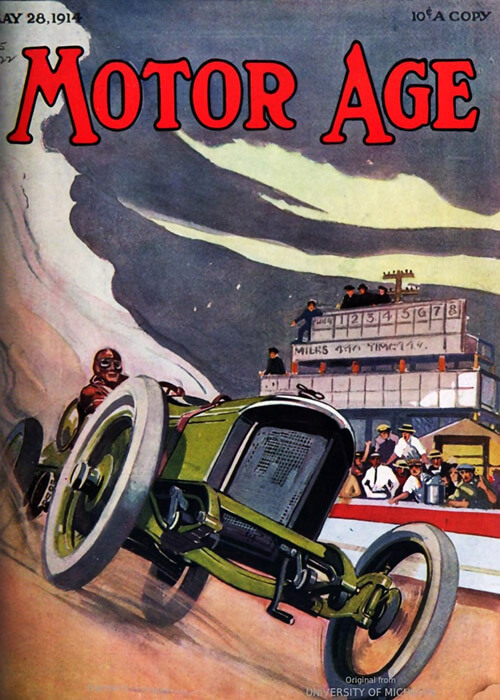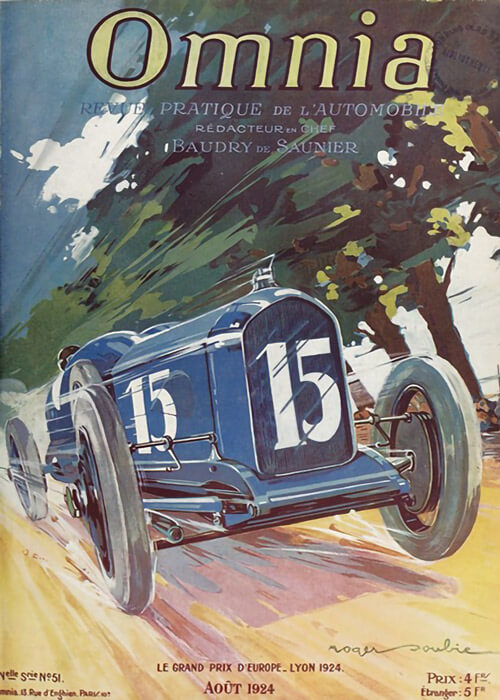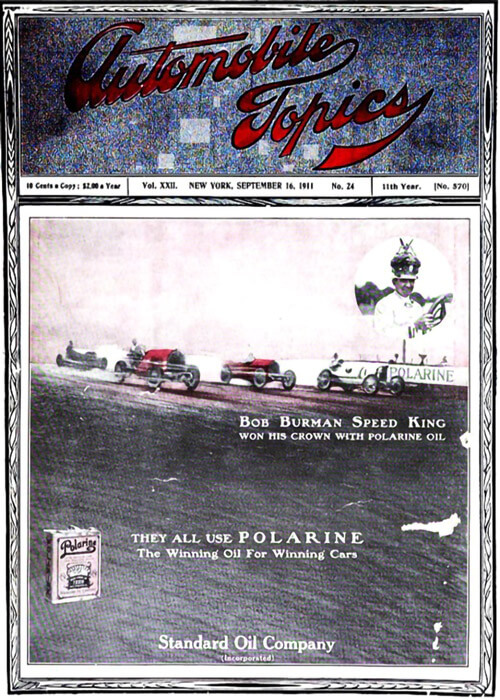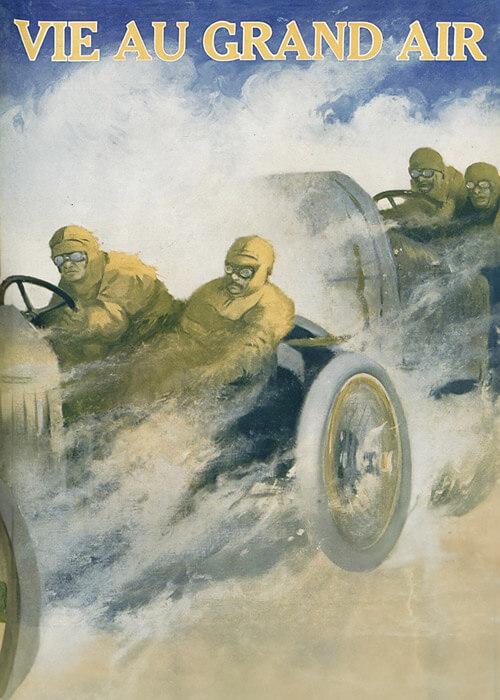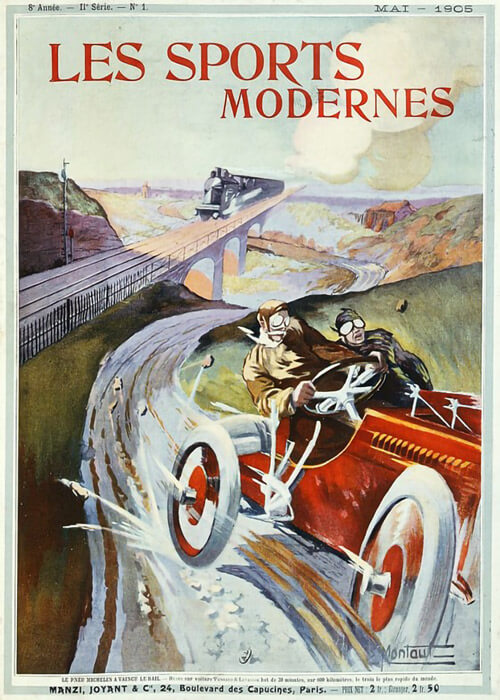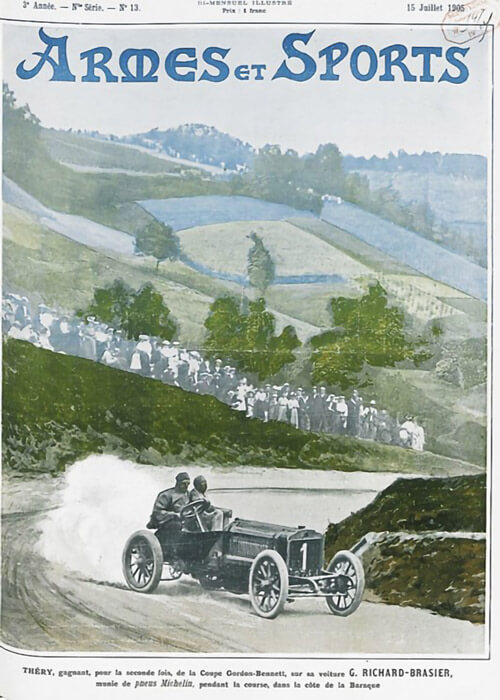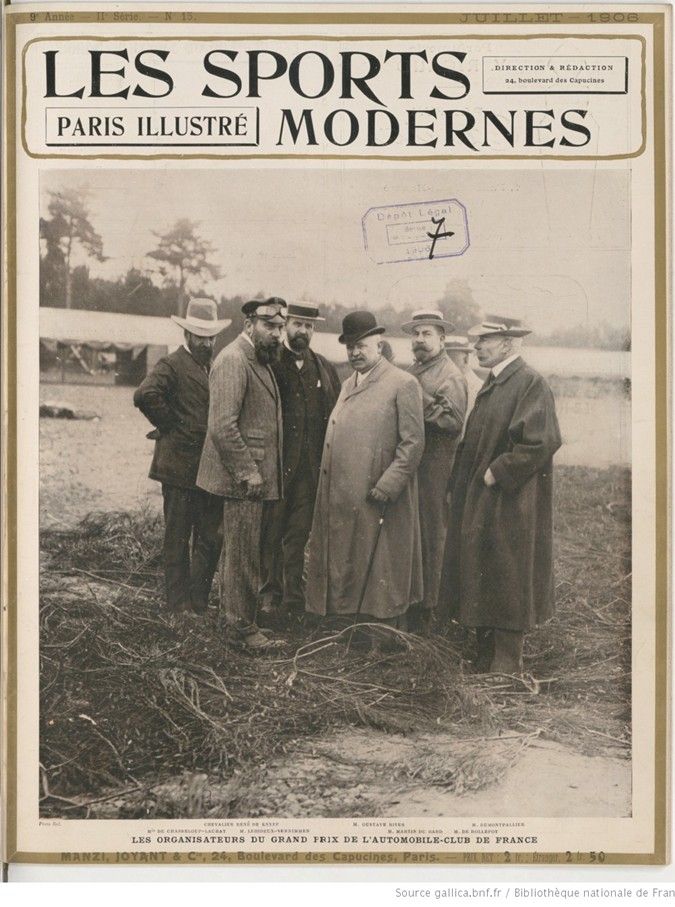
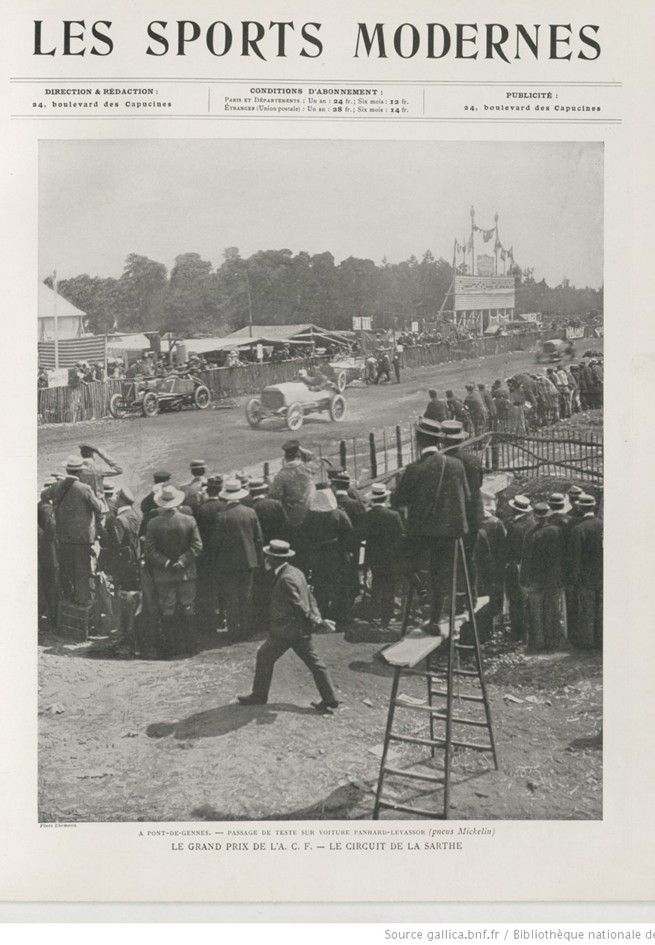

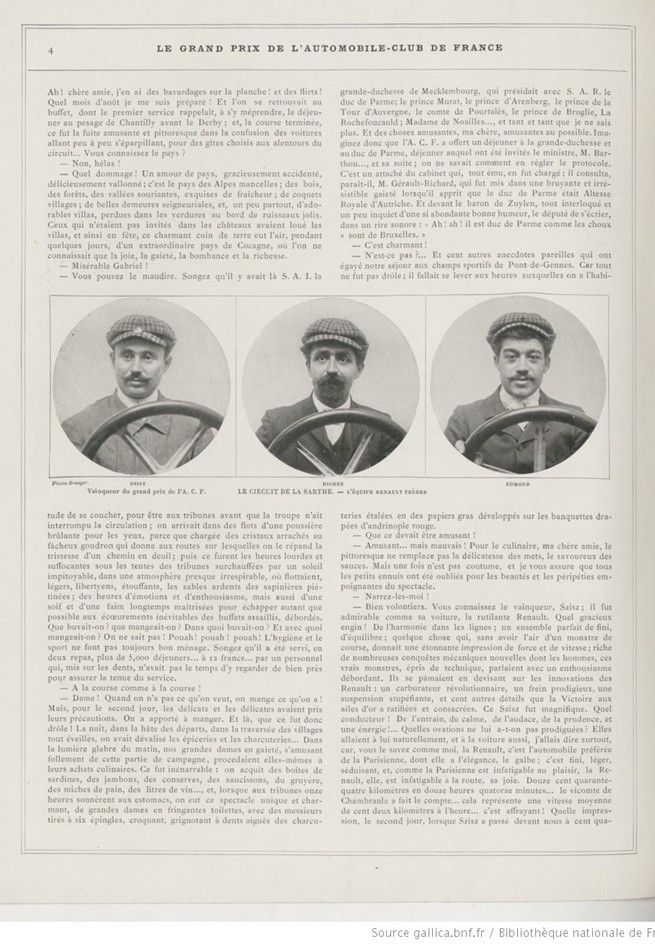
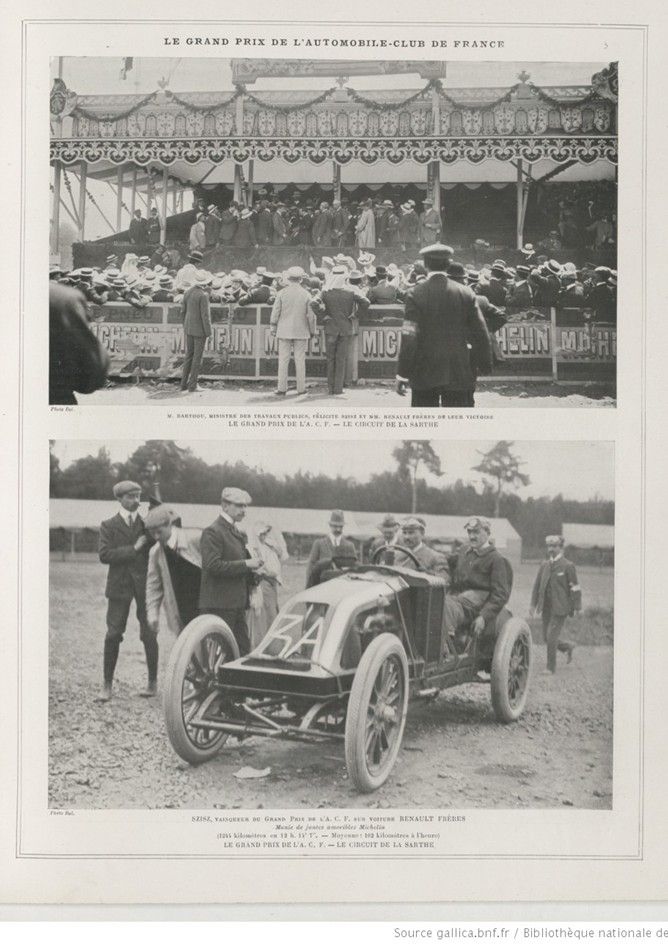
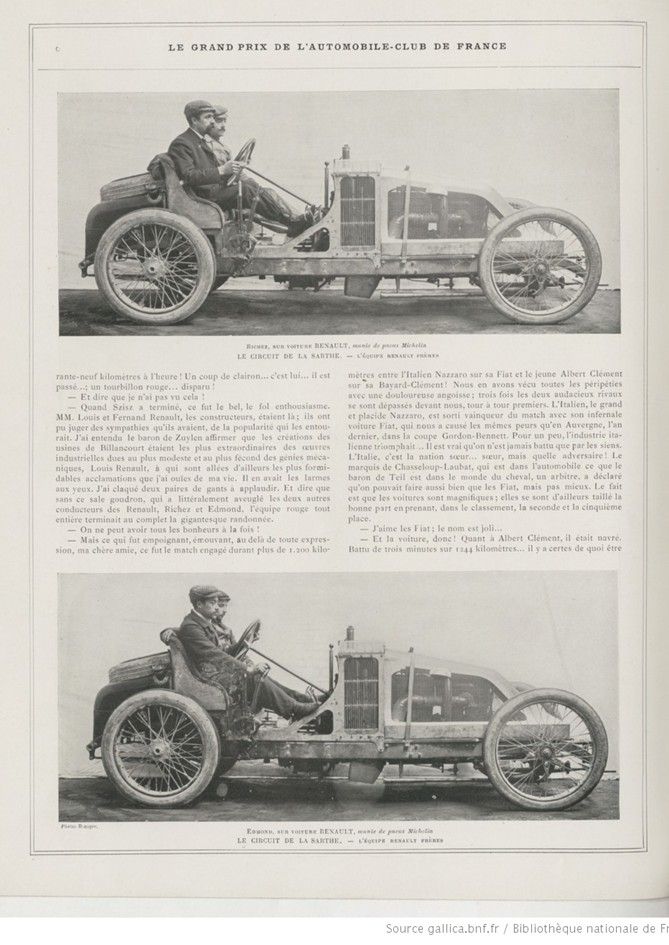
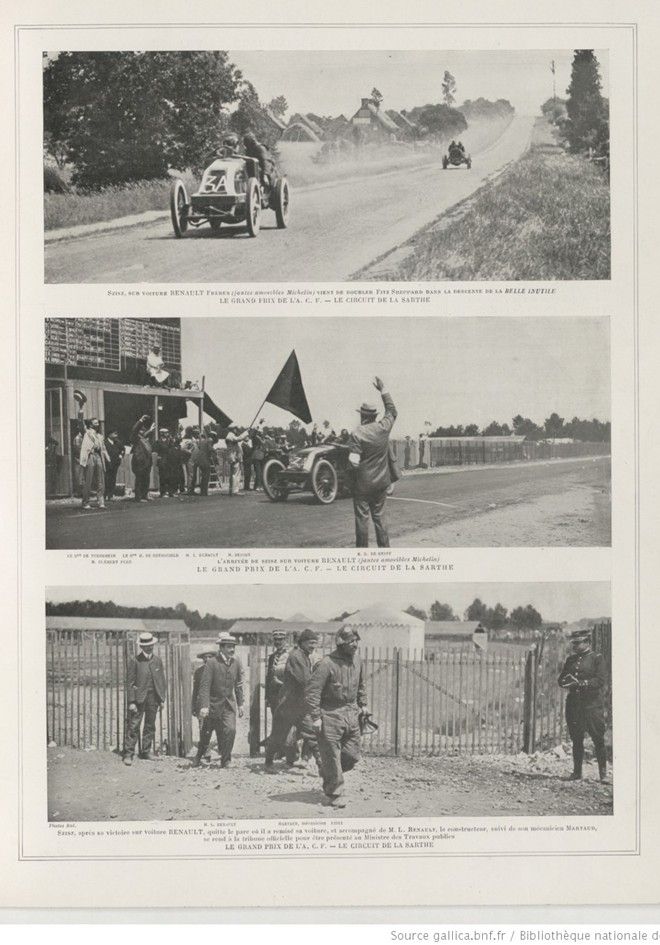
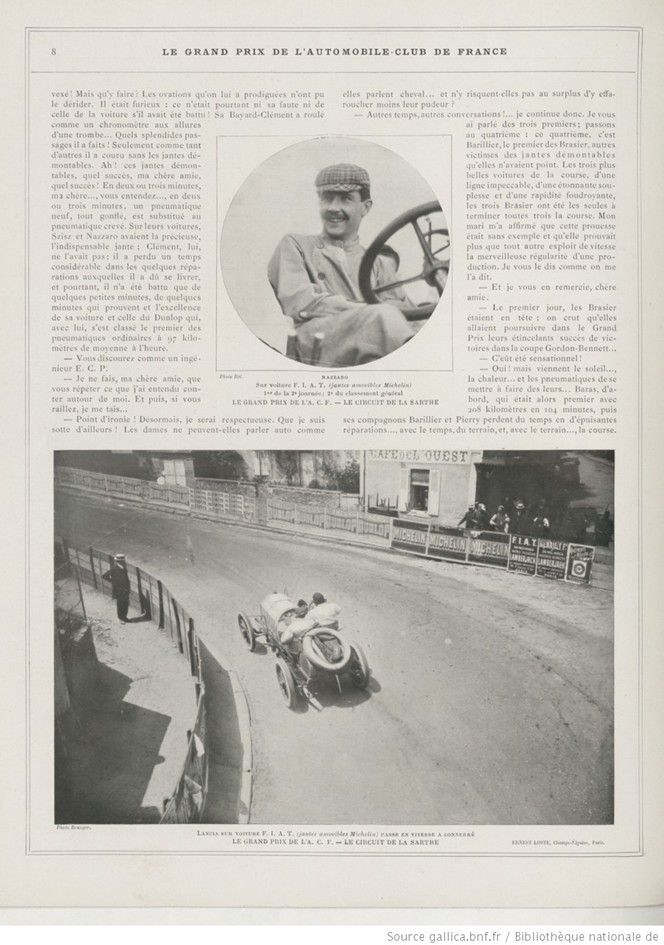

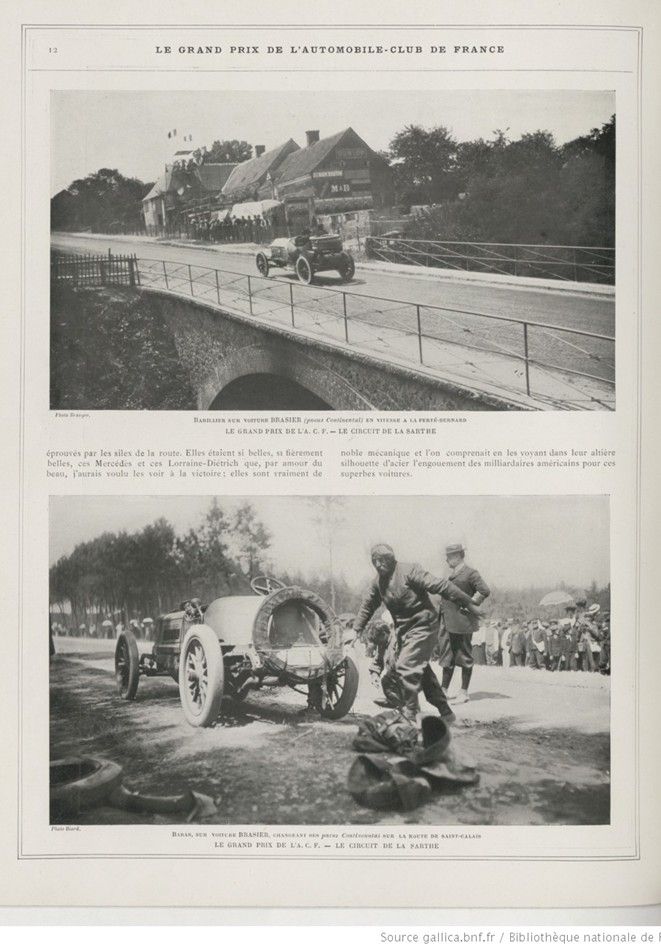

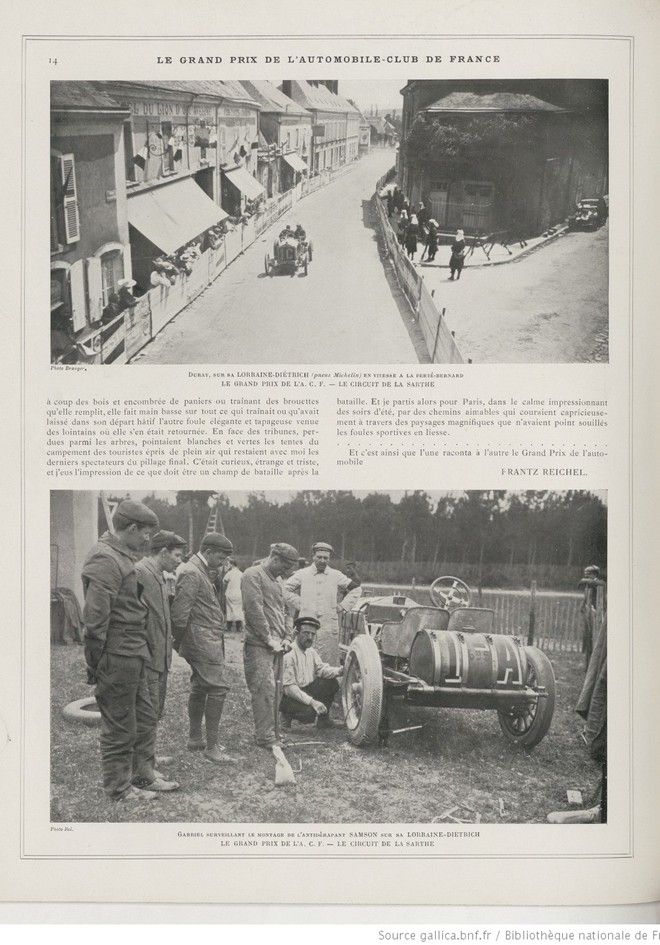
Text and photos by authorisation of Bibliothèque nationale de France – gallica.bnf.fr https://www.bnf.fr/fr
Translation by DeepL.com of LE GRAND PRIX DE L’AUTOMOBILE-CLUB DE FRANCE
Les Sports Modernes, 9th Year, 11th Serie, No. 15, July 1906
THE GRAND PRIX OF THE AUTOMOBILE CLUB OF FRANCE
„Oh my dear, what am I hearing? What news is this? You witnessed Szisz’s victory, Renault’s triumph? How lucky you are! How I envy you! Quickly, please, tell me all about it, every detail, because you see, I am passionate about cars, and if it weren’t for my monster of a husband, my odious Gabriel, I would have gone to Pont de-Gennes myself. Wasn’t it wonderful? I’m told that all of Paris, the real, chic Paris, was there; that, if it hadn’t been for the presence of a minister and a few left-wing deputies, it would have been truly wonderful, absolutely wonderful. Is that true?
– Yes! Delightful! How I pity you for staying here! But, dear friend, Paris had to be empty! It was a real aristocratic gathering over there.
If only you could have seen those stands! A delightful and almost unbelievable sight. Imagine the most dazzling of Longchamp’s weigh-ins transported to the middle of a distant plain, in a solitude of sand bristling with fir trees. In the shade of the cream and gold canopy of the stands, with a pretty line from which you couldn’t see much, it’s true, but where you were so well seen, an incomparable audience. Oh dear Jesus, how glad I am that I didn’t listen to Gaston! If I had believed him, I would have left with nothing but a chauffeur’s outfit! “You’ll see,” he said to me, “how useless all your finery is! You’ll only meet people dressed in leather or canvas.” I did as I pleased, and I’m glad I did. I have never seen so many outfits!
— Not possible
— Surprising, but true That’s the style now, and it’s a good one, in my opinion; people no longer travel by car wearing formal dresses; it’s in bad taste… like a man riding a bicycle in shorts, or a woman wearing the same outfit. Light-colored dresses, gauze, linen, tulle, lace, large hats, flowers, fruit, feathers, everything we love and everything they adore.
— But it’s the triumph of the closed car.
— Of course! And you understand why this A.C.F. Grand Prix meeting was so charming. We visited each other’s boxes; introductions, memories of evenings, of castles…; invitations for the holidays…
Ah! Dear friend, I have so much gossip and flirting to share! What an August I have in store for myself! And we would meet at the buffet, whose first service was reminiscent of lunch at the Chantilly weigh-in before the Derby; and, once the race was over, there was the amusing and picturesque rush as the cars gradually scattered, heading for their chosen lodgings around the circuit… Do you know the area?
— No, unfortunately!
— What a pity! It’s a lovely area, gracefully rugged, delightfully hilly; it’s the land of the Alpes Mancelles; woods, forests, smiling valleys, exquisitely fresh; pretty villages; beautiful stately homes, and, here and there, adorable villas, lost in the greenery by pretty streams. Those who were not invited to the castles had rented the villas, and so, in celebration, this charming corner of the earth looked, for a few days, like an extraordinary land of plenty, where only joy, cheerfulness, feasting, and wealth were known.
— Miserable Gabriel!
— You can curse him. Consider that His Imperial Highness the Grand Duchess of Mecklenburg was there, presiding with His Royal Highness the Duke of Parma; Prince Murat, Prince Arenberg, Prince de la Tour d’Auvergne, Count Pourtalès, Prince de Broglie, La Rochefoucauld; Madame de Noailles… and so many others that I can’t remember them all. And amusing things, my dear, amusing as can be. Imagine, then, that the A.C.F. offered lunch to the Grand Duchess and the Duke of Parma, to which the minister, Mr. Barthou…, and his entourage were invited; no one knew how to handle the protocol. It was a cabinet attaché who, quite moved, was put in charge of it; He consulted, it seems, Mr. Gérault-Richard, who was overcome with boisterous and irresistible glee when he learned that the Duke of Parma was a Royal Highness of Austria. And in front of Baron Zuylen, who was taken aback and a little uneasy by such abundant good humor, the deputy exclaimed, with a hearty laugh: “Ah! Ah! He is Duke of Parma as Brussels sprouts are Brussels.”
— How charming!
— Isn’t it? … And a hundred other similar anecdotes cheered up our stay at the Pont-de-Gennes sports grounds. For it wasn’t all fun and games; we had to get up at the hour we were used to going to bed in order to be in the stands before the troops interrupted traffic; we arrived in clouds of dust that burned our eyes because it was laden with crystals torn from the unfortunate tar that gives the roads on which it is spread the sadness of a path in mourning; then came the heavy, suffocating hours under the stands‘ tents, overheated by a merciless sun, in an almost unbreathable atmosphere, where the hot sand from the trampled pine forests floated lightly, suffocatingly, like a cloud of dust; hours of excitement and enthusiasm, but also of thirst and hunger long suppressed in order to escape as much as possible the inevitable disgust of the besieged, overwhelmed buffets.
What did we drink? What did we eat? What did we drink from? And what did we eat with? We don’t know. Yuck! Yuck! Yuck! Hygiene and sport don’t always go hand in hand. Consider that over 5,000 lunches were served in two meals… at 12 francs… by staff who, working flat out, didn’t have time to look too closely to ensure the service ran smoothly.
— In a race, as in a race.
— Well, when you don’t have what you want, you eat what you have! But for the second day, the delicate ones had taken precautions. They brought food with them. And then, how funny it was! At night, in the rush to leave, passing through villages that were wide awake, they had raided the grocery stores and delicatessens… In the bare light of morning, our grand ladies, in high spirits, enjoying themselves wildly on this outing, proceeded to do their own culinary shopping. It was indescribable: they bought tins of sardines, hams, preserves, sausages, Gruyère cheese, loaves of bread, liters of wine… and when eleven o’clock struck on the grandstands and our stomachs began to rumble, we had the unique and charming spectacle of grand ladies in elegant dresses, accompanied by gentlemen dressed to the nines, crunching and nibbling with sharp teeth at delicatessen meats spread out on greasy paper laid out on benches draped in red Andrinople cloth.
— How amusing it must have been!
„Fun… but bad. When it comes to food, my dear friend, picturesqueness is no substitute for the delicacy of the dishes or the flavor of the sauces. But once is not a habit, and I assure you that all the little annoyances were forgotten in favor of the beauty and thrilling twists and turns of the show.
— Tell me about them.
— With pleasure. You know the winner, Szisz; he was as admirable as his car, the gleaming Renault. What a graceful machine! Harmony in its lines; a perfect combination of finish and balance; something that, without looking like a racing monster, gave an astonishing impression of strength and speed; rich in numerous new mechanical conquests that men, those true monsters, enamored with technology, spoke of with boundless enthusiasm. They swooned as they discussed Renault’s innovations: a revolutionary carburetor, a prodigious brake, an astonishing suspension, and a hundred other details that the golden-winged Victory ratified and consecrated. This Szisz was magnificent. What a driver! Enthusiasm, calm, daring, caution, and energy! What ovations he received! They came naturally to him, and to the car too, I was going to say especially, because, as you know as well as I do, the Renault is the favorite car of Parisian women, with its elegance and curves; it is refined, light, seductive, and, just as Parisian women are tireless in their pursuit of pleasure, the Renault is tireless on the road, its joy. Twelve hundred and forty-four kilometers in twelve hours and fourteen minutes… the Viscount de Chambranle did the math… that’s an average speed of one hundred and two kilometers per hour… it’s frightening! What an impression it made on the second day when Szisz passed us at one hundred and forty-nine kilometers per hour. A bugle call… it’s him… he’s passed… ; a red whirlwind… gone.
— And to think I didn’t see that
— When Szisz finished, there was great, wild enthusiasm.
Messrs. Louis and Fernand Renault, the manufacturers, were there; they could gauge the sympathy they enjoyed and the popularity that surrounded them. I heard Baron de Zuylen say that the creations of the Billancourt factories were the most extraordinary industrial works produced by the most modest and prolific of mechanical geniuses, Louis Renault, who received the most tremendous applause I have ever heard in my life. He had tears in his eyes. I snapped two pairs of gloves applauding him. And to think that without that nasty tar, which literally blinded the other two Renault drivers, Richez and Edmond, the entire red team would have finished the gigantic race.
— You can’t have all your wishes come true at once
— But what was gripping and moving beyond words, my dear friend, was the battle that raged for more than 1,200 kilometers between the Italian Nazzaro in his Fiat and the young Albert Clément in his Bayard-Clément. We followed all the twists and turns with painful anxiety; three times the two daring rivals overtook each other in front of us, taking turns in the lead. The Italian, the tall and placid Nazzaro, emerged victorious with his infernal Fiat car, which caused us the same fears as in Auvergne last year in the Gordon Bennett Cup. The Italian industry was on the verge of triumph…
It is true that one is only ever beaten by one’s own. Italy is a sister nation… a sister, but what an adversary!
The Marquis de Chasseloup-Laubat, who is to the automobile world what Baron de Teil is to the world of horses, an arbiter, declared that we could do as well as the Fiats, but not better. The fact is that the cars are magnificent; they also took the lion’s share of the prize money, coming in second and fifth in the rankings.
— I like Fiats; it’s a nice name…
— And the car too! As for Albert Clément, he was devastated.
Beaten by three minutes over 1,244 kilometers… it was certainly enough to be upset about! But what could he do? The ovations he received couldn’t cheer him up. He was furious: it wasn’t his fault or the car’s fault that he had been beaten. His Bavard-Clément drove like a stopwatch at breakneck speed… What splendid passages he made! Only, like so many others, he raced without removable rims. Ah, those removable rims, what a success, my dear friend, what a success! In two or three minutes, my dear… you hear me… in two or three minutes, a new, fully inflated tire replaces the flat one. Szisz and Nazzaro had the precious, indispensable rim on their cars; Clément did not have them; he lost a considerable amount of time in the few repairs he had to make, and yet he was only beaten by a few minutes, a few minutes that prove the excellence of his car and that of Dunlop, which, with him, ranked first among ordinary tires at an average speed of 97 kilometers per hour.
“You talk like an E.C.P. engineer.”
“My dear friend, I am only repeating what I have heard people around me say. And if you are mocking me, I will be quiet…”
„No irony! From now on, I will be respectful. How silly of me! Can’t ladies talk about cars the way they talk about horses… and isn’t there less risk of offending their modesty that way?
— Different times, different conversations!… So I’ll continue. I’ve told you about the first three; now let’s move on to the fourth: the fourth is Barillier, the first of the Brasiers, another victim of the removable rims they didn’t have. The three most beautiful cars in the race, with impeccable lines, astonishing flexibility, and lightning speed, the three Brasiers were the only ones to finish the race. My husband assured me that this feat was unprecedented and that it proved, more than any other speed achievement, the marvelous consistency of a product. I’m telling you this as I was told.
— And I thank you for that, my dear friend.
— On the first day, the Brasiers were in the lead; it was believed that they would continue their sparkling successes in the Gordon Bennett Cup in the Grand Prix…
— It would have been sensational
— Yes, but then came the sun…, the heat… and the tires started to play up… First Baras, who was then in the lead with 208 kilometers in 104 minutes, then his companions Barillier and Pierry lost time in exhausting repairs… with time, ground, and with ground… the race.
— Fortune is capricious…
— Certainly…! And while it’s always the same people who get killed, it’s not always the same people who win. Everyone has their share of bad luck… Such as Panhard. Our great national company, the pride of our industry, is going through a rough patch. It had three cars at the Circuit de la Sarthe, which were by far the fastest in the field. Very fast, perhaps too fast, because two of the three ended up in the ditch; the third finished a brilliant sixth with Mr. Heath at the wheel.
—What a fine driver!
— He’s perfect.
— Isn’t he? I find him very sporty, very smart, with his tall stature, his composure, his correctness, his gentle and energetic head, blond… blue eyes…
“Good heavens! And you admit all that without blushing! If Gabriel heard you!
”But he can’t hear me!
„It shows! Have I told you everything? Let’s see… No! Not yet! Never mind if my story is a bit jumbled; when I’m interrupted, I lose my train of thought… What else do you need to know? That of the eleven cars that finished, five owed it to their Continental tires, which my husband calls the Kaiser of the road! And that Gabriel—not your husband, my dear—Gabriel, the king of the wheel, had adopted Samson anti-skid tires, without which driving is a sport more dangerous than the most perilous acrobatics!
You know all that… so what else? And since I mentioned bad luck, let me point out the monumental misfortune of Mercedes and Lorraine-Dietrich, both of which suffered:
1st, their speed, which led three of them into the ditch where, in somewhat abrupt collisions, they damaged their sturdy structure; 2nd, the suffering of their drivers, blinded by the tar; and 3rd, that of their tires, insolently tested by the flints on the road. These Mercedes and Lorraine-Dietrich cars were so beautiful, so proudly beautiful, that, for the love of beauty, I would have liked to see them win. They are truly noble machines, and seeing their haughty steel silhouettes, one could understand the enthusiasm of American billionaires for these superb cars.
“What a prestigious car saleswoman you would make! But now that I know who won and who lost, give me some side stories.”
„Here they are. The winner carried in triumph… Louis and Fernand presented to the minister, who showers them with government praise… It’s the red ribbon for Louis Renault at the next Motor Show… René de Knyff triumphing over the triumph of the race… the race coming to an end… the frantic flight of spectators, officials, and organizers… a complete and surprising silence suddenly replacing the rumors and noise of the day… the stands and enclosures, so lively just a moment ago, now deserted, and, as the day draws to a close and night falls, a ragged crowd suddenly emerges from the woods, laden with baskets or dragging wheelbarrows which they fill, helping themselves to everything that was lying around or had been left behind in the hasty departure of the other elegant and boisterous crowd that had come from afar and now returned there. Opposite the stands, lost among the trees, the white and green tents of the camp of tourists who loved the outdoors stood out, and they remained with me as the last spectators of the final pillaging. It was curious, strange, and sad, and I had the impression of what a battlefield must be like after the battle. And so I left for Paris, in the impressive calm of summer evenings, along pleasant roads that ran capriciously through magnificent landscapes that had not been sullied by jubilant sports crowds.
……………………..
And that is how one told the other about the Grand Prix automobile race.
FRANTZ REICHEL.
